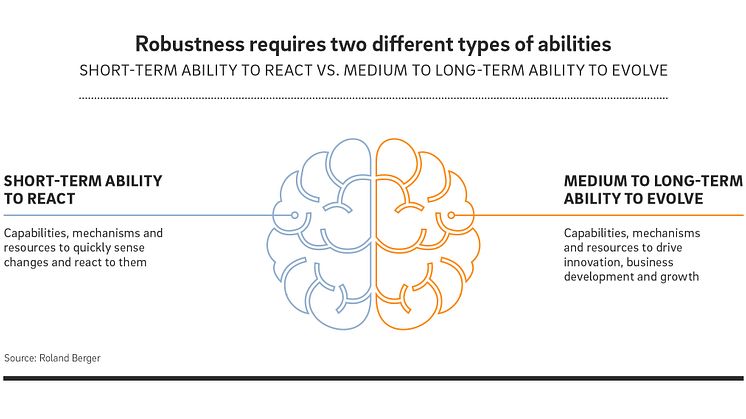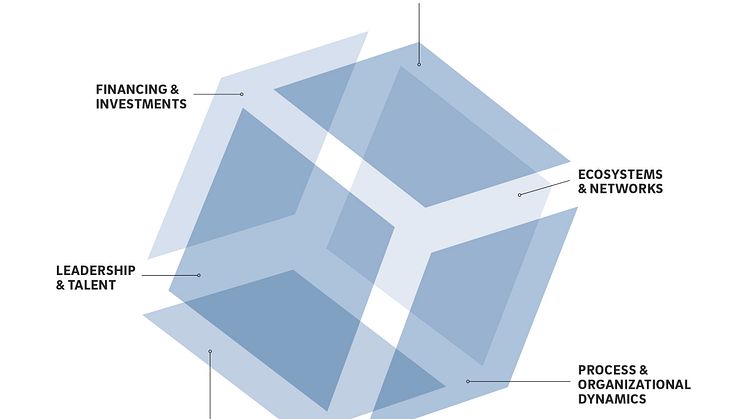Press release -
The path to success for robust organizations: Adaptability beats the search for perfection
- The right organizational structure is only one among many levers
- Robust companies are responsive, able to adapt and maintain flexible resources
- Frontrunners do not just react, they actively drive change
Munich, October 2021: Private and public sector organizations are under pressure from two sides. Long-term developments such as climate change, economic crises and geopolitical upheavals are calling for decisive action now. Yet in our globalized and highly connected world, uncertainty over what the future holds is greater than ever. Organizations that can weather a crisis have a key characteristic in common: they are robust and cultivate maximum ability to adapt and evolve. This is one of the key findings of the Roland Berger study, "Robustness: Building all-weather organizations – Thriving in times of turbulence", which examines what makes particularly resilient companies so successful.
"Companies today have little time to evaluate, decide and then react accordingly. The complexity of the many different variables makes advance planning almost impossible. What matters in this environment is robustness – the ability of an organization to adapt, develop and evolve, navigating uncertainty while preserving its functioning, competitive stance and long-term growth," says Ina Wietheger, Partner at Roland Berger.
To improve their resilience, organizations – both private and public – should adopt a holistic approach. Six dimensions are critical. First, it is important to develop a shared purpose, strategy and culture that is continuously evolving in order to keep the organization focused on achieving new goals and exploiting new opportunities. Second, inspiring leadership and an empowered workforce creates sensitivity to opportunities, new ideas and innovations, and fosters ambition for change. In financing, the third of the identified dimensions, robust companies rely on short-term liquidity, a capital buffer and a balanced long-term investment portfolio to maintain sufficient leeway to operate. Short-term liquidity buffers are also important beyond this in order to be able to react flexibly and seize growth opportunities.
As far as the fourth dimension – process and organizational dynamics – is concerned, companies should establish clear rules to adapt their structural setup to the needs of the moment. This is both more beneficial and offers more scope than searching for the perfect organizational structure. Particularly important are strong support and business-platform functions that cut across different businesses. Robust organizations engage in fluid, project-based work and have prompt decision-making processes and clear allocation of process owners. The fifth aspect, ecosystems and networks, is becoming increasingly important for organizations to not only sense and anticipate change early on, but also to shape it and drive innovation.
Finally, organizations that want to remain successful in uncertain times need a clear data and digitalization strategy and goals – the sixth dimension. Modular, integrated supporting IT systems and a strong focus on the core business accelerate new business models and the scaling of systems.
"The big challenge is to link an organization's appetite for risk with the stability it needs – in other words, to create effective incentives to explore opportunities while keeping a firm eye on strategic goals," Tina Wang, Partner at Roland Berger, sums up.
Topics
Categories
Roland Berger is the only management consultancy of European heritage with a strong international footprint. As an independent firm, solely owned by our partners, we operate 50 offices in all major markets. Our 2400 employees offer a unique combination of an analytical approach and an empathic attitude. Driven by our values of entrepreneurship, excellence and empathy, we at Roland Berger are convinced that the world needs a new sustainable paradigm that takes the entire value cycle into account. Working in cross-competence teams across all relevant industries and business functions, we provide the best expertise to meet the profound challenges of today and tomorrow.





